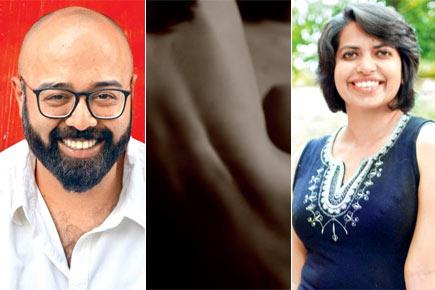Two Indian writers are set to lift the veil off their 'dirty secrets' with tell-all memoirs. But, can you read without cringing? The books takes us on an unsettling journey into the beautiful, but troubled mind of a man


Pic/Getty Images
In two hours, Shreevatsa Nevatia and this writer have gone back-and-forth three times trying to reschedule an interview. He is, as he tells us, caught up with closing the edition of the magazine he edits. With our own deadline looming, it's hard not to be pushy. Yet, we are slightly apprehensive.
Fresh out of reading his memoir, How To Travel Light (Penguin Random House), slated for release in the third week of October, Nevatia seems all too familiar. Hinging on his bipolarity, a condition associated with episodes of mood swings ranging from depressive lows to manic highs, the book takes us on an unsettling journey into the beautiful, but troubled mind of a man, trying to make sense of the world. We have now become a part of it, and we don't want to infringe.

Shreya Sen-Handley
Nevatia, who was diagnosed with the condition in 2007, is fully aware of this scrutiny. "I often wonder, what if somebody read my book, and then met me for the first time; how would I have a conversation that is novel. This person would know everything that I have to say," he jokes, "But that would be unfortunate."
The confessional memoir has a reputation of generating cringe and shock. Its purpose is to rattle, if not upset. Nearly 55 years after American writer Sylvia Plath wrote the semi-autobiographical novel, The Bell Jar, readers are still trying to trace Plath's life in the protagonist, Esther. With the tell-all memoir, this veil is lifted — the author takes full ownership of the narrative and characters. Though sometimes criticised for being exhibitionist, the conversation it sparks cannot be ignored.

Shreevatsa Nevatia. Pic/Rumela Basu
In 1997, when writer Kathryn Harrison wrote The Kiss, recounting her incestuous relationship with her father, critics referred it as a "testament to evil". Closer home, Rosalyn D'Mello's A Handbook For My Lover (2015), chronicled the protagonist's relationship with a man 30 years her senior. D'Mello didn't conceal the authenticity of the tale: "To strip you must contend with shame. You must learn to make too much of dust," she wrote in her prologue. Shreya Sen-Handley's recent title, Memoirs of My Body (HarperCollins) is the latest to lay bare uncomfortable truths about explorations of the body and love.
The coincidence is uncanny; both Handley and Nevatia's memoirs have emerged from conversations they started through independent pieces that they wrote. The response to Handley's columns on "sex, relationships, bodily processes" and Nevatia's eye-opening essay, A Pause In My Meteor Showers, where he first made public his condition, demanded some more dwelling. The results are two starkly different, but equally reactionary narratives that beg to be heard.
Who's afraid of judgment?
It would be a lie if someone penning their memoir, said they hadn't once thought about the consequences of making their private life readily available for public consumption. For Handley, the book stemmed out of the need to have conversations around masturbation, menstruation and miscarriage, "so that they stop being frightening, dirty or criminal." "Well, yes, it wasn't an easy book to write. I did also eventually worry about the repercussions, but for the most part I wrote like they advise you to dance — like no-one's watching. I wrote without worrying about what prudes, or bigots, might say, without a nod to commercial considerations," admits Handley.
Nevatia says apart from finding the courage to tell his story, what compelled him to write his memoir was the eternal pursuit of fun. "[With the earlier column] I had already set aloud things that are otherwise, best kept secret by fellow patients and sufferers," he says. "For some reason, we have a strange private and public divide, and we take it too seriously. I think that we do live in an age of disclosure, which is perhaps more permissive and allows people to tell their narratives in whatever way they deem fit." He, however, admits that he only decided to write the book after speaking to his parents, closest friends and doctors. "And, only once they all said that this would do me good, did I actually go ahead," he says.
"I didn't have to prepare them [my family]," says Handley. "That's not to say nothing about it made them uncomfortable. But intelligent, broad-minded people understand that there's a need to talk about the things that have been shrouded unnecessarily in shadow," she adds.
Discussing the horror
In How To Travel Light, when Nevatia talks of suffering abuse by his older cousin, the experience is irrefutably gut wrenching. The horror of child abuse, compounded by the trauma of coping with his condition, fuelled by his drug habit, make him the tragic hero of painful circumstances. "Whenever I have been manic, it has been eventually, a kind of final act, where my aggression peaks and I cannot think beyond my [child] abuse. It is clearly something that has defined me for a while, and perhaps unfortunately so, about the way I think about the world. This is quite simply an experience that I had, and one that informed me and my conscience," he says.
But, he hopes that once people read the book, they "don't actually go to find that person". He simply hopes to lighten the load of other sufferers. With Handley, for example, after writing about her violent ex-husband, she felt like a weight had lifted from her shoulders. "I wrote it with only one criterion — that it should be written in a manner that is right for the subject — the exploration of the physical parts of our lives. And that it should have all the light and dark that is in me. As a result, I chuckled through much of it but I also cried over certain bits," she says.
Cathartic experience
For Nevatia, if there is one good thing that came out of the experience, it was that he stopped seeing his life as tragic. "As a matter of fact, I started looking at it as profoundly comical," he says, explaining, "When you are writing, you are putting it all down, and beginning to consider it. And, it's in that consideration and speaking, and wanting to arrive at a semblance of truth that you see yourself from the outside, from afar. I am glad that I can laugh at myself more now," he says, adding that the fact he helms a respected travel magazine establishes that his condition, may have altered him, but not impeded his prospects.
What the writers, however, resist is their memoirs being pigeon-holed as "confessional". "When you confess, you seek forgiveness or understanding. That's not what this book is about. Instead, it is honest and forthright. I'm told that the voice in this book is a strong voice, an angry voice and the voice of a woman who laughs at the world and herself plenty. There is no mewling plea for understanding here. I want understanding for all women and for the men who don't conform," says Handley.
 Subscribe today by clicking the link and stay updated with the latest news!" Click here!
Subscribe today by clicking the link and stay updated with the latest news!" Click here!







